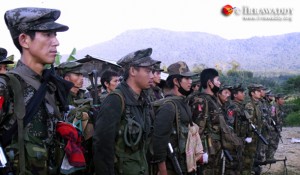Posts Tagged ‘Arakan State’ (147 found)
HRWG Calls NHRI to Make an Investigative Report on Rohingya Issue
Human Rights Working Group (HRWG) is disturbed with the human rights violations against Rohingya in Rakhine State, West Myanmar. Governments in ASEAN cannot stay idle on the situation and take the issue as a regional concern […]
• • •“The Government Could Have Stopped This”: Sectarian Violence and Ensuing Abuses in Burma’s Arakan State
This report describes how the Burmese authorities failed to take adequate measures to stem rising tensions and the outbreak of sectarian violence in Arakan State. Though the army eventually contained the mob violence in the state capital, Sittwe, both Arakan and Rohingya witnesses told Human Rights Watch that government forces stood by while members from each community attacked the other, razing villages and committing an unknown number of killings […]
• • •Burma: Government Forces Targeting Rohingya Muslims
Abuses Follow Horrific June Violence Between Arakan Buddhists and Rohingya
Burmese security forces committed killings, rape, and mass arrests against Rohingya Muslims after failing to protect both them and Arakan Buddhists during deadly sectarian violence in western Burma in June 2012. Government restrictions on humanitarian access to the Rohingya community have left many of the over 100,000 people displaced and in dire need of food, shelter, and medical care […]
• • •Myanmar: Pillay Concerned About Human Rights Situation in Rakhine State
UN High Commissioner for Human Rights Navi Pillay on Friday raised serious concerns about ongoing human rights violations in Myanmar’s Rakhine state after the violence between the Buddhist and Muslim communities there, urging a prompt, independent investigation […]
• • •UK Must Act On Arakan and Rohingya Crisis
Burma Campaign UK today called on British Foreign Secretary William Hague to end his silence on the current crisis in Burma and step up British diplomatic efforts to end the crisis. The current crisis has evolved into Burmese government led repression against the Rohingya […]
• • •A Long Way to Go for People in Burma’s Ethnic Areas
 Leaders of ten ethnic and opposition political parties met with President Thein Sein this week for the first time. The meeting in Naypyidaw afforded the opportunity for the MPs to raise key issues, including the rule of law, changes to the electoral system and peace building. However, the government’s response to an MP’s request for the inclusion of ethnic languages and literature in school curriculum was illustrative of how it views the rights of ethnic people and minorities.
Leaders of ten ethnic and opposition political parties met with President Thein Sein this week for the first time. The meeting in Naypyidaw afforded the opportunity for the MPs to raise key issues, including the rule of law, changes to the electoral system and peace building. However, the government’s response to an MP’s request for the inclusion of ethnic languages and literature in school curriculum was illustrative of how it views the rights of ethnic people and minorities.
Railway Minister and Thein Sein’s chief negotiator with armed ethnic groups, Aung Min, said that the government would allow teaching the Mon language and would provide US$1 million to fund it. However, Banyar Aung Moe, an Upper House MP for the All Mon Regions Democracy Party said, “[Aung Min] told us that the teaching time would be out of school hours. I am not satisfied with this as our party proposed allowing teaching in the government’s school time.”
Also this week, the speaker of the Lower House of Parliament, Shwe Mann, reportedly told Banyar Aung Moe that the government agrees to set up a federal union at some point in the future in order to achieve peace. However, when looking at the reality that ethnic people face, it is easy to take such comments as those from Aung Min and Shwe Mann as little more than empty placations […]
Special Rappertour on the Situation of Human Rights in Myanmar Should Conduct a Comprehensive Investigation for the Situation of Rohingya Muslim in Burma
KontraS received information that several acts of violence took place following the rape and killing of a Buddhist woman in late May 2012, in which the perpetrators were alleged Rohingya Muslims. Subsequently, on June 2nd, 2012 ten Muslim bus passengers were beaten to death by a mob seeking revenge for the crime. In the days that followed, there have been numerous and conflicting reports of further sectarian attacks perpetrated by both Buddhist and Muslim residents […]
• • •Myanmar: Abuses Against Rohingyas Erode Human Rights Progress
Six weeks after a state of emergency was declared in Myanmar’s Rakhine State, targeted attacks and other violations by security forces against minority Rohingyas and other Muslims have increased, Amnesty International said today.
Communal violence in the state has also continued […]
• • •Solidarity Activists Urge Burma’s Thein Sein to Restore Rohingyas Citizenship and Ethnic Rights; Ask UN, ASEAN to Probe Sectarian Violence in Arakan State
“The continued refusal of the government of Burma to recognize the ethnic rights, civil and political freedoms, and citizenship of the Rohingyas are clear violations of international law. Advertising reforms while violating the human rights of another section of your society is a complete paradox. Unless the regime of Burma corrects its past mistakes, all its efforts will just become an epic failure […]”
• • •Civil Society Organisations Deeply Concerned by On-going Violence Against Stateless Rohingya in Myanmar and their Refoulement from Bangladesh
The stateless Rohingya of Myanmar have suffered from extreme persecution and discrimination for decades. They are now facing another crisis. On 3 June inter-communal violence erupted, and this has evolved into large-scale state sponsored violence against the Rohingya. Despite this, neighbouring Bangladesh is not allowing them to enter to seek refuge. The Rohingya population needs urgent measures to be taken for their protection […]
• • •








 All posts
All posts